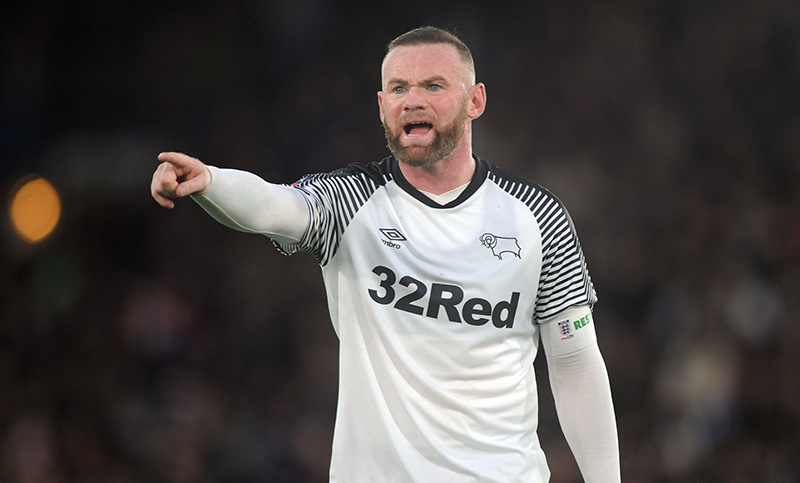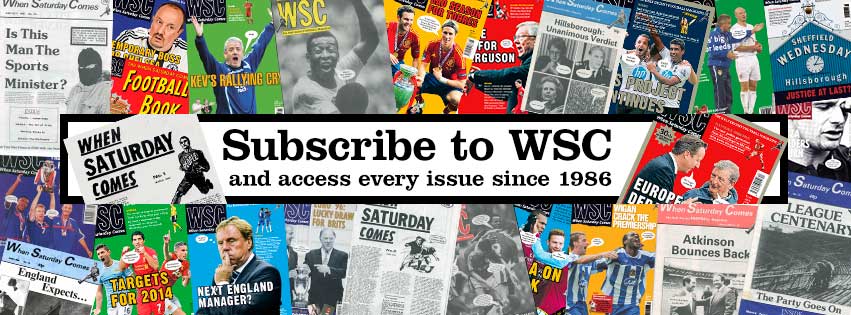With clubs under increasing financial pressure to achieve promotion to the Premier League, the role of a betting sponsor in making the move happen is a sign of things to come
January 22 ~ Wayne Rooney’s much-anticipated debut for Derby County, in a 2-1 win over Barnsley on January 2, brought worldwide attention to England’s second tier. But much of the coverage it generated was less about the performance of an ageing former global star, and more about the motivations behind his return to English football after a year in MLS with DC United.
Rooney’s debut was preceded by a heartfelt video in which the 34-year-old detailed his struggles with gambling which resulted in debts of £700,000 when he was a young player. “Before you know it you’ve lost a good bit and you don’t realise the amount you’re putting on at the time,” he said. “I won at the start and thought it was easy money. It sucks you in a bit more and I ended up losing.” For such a big-name player to speak so frankly about gambling addiction is always welcome, and Rooney is obviously free to do what he likes, but he did so in a video produced by 32 Red, the betting company who also funded his arrival at Derby (though Rooney’s wages come from the club, they are able to pay them due to the record-breaking sponsorship deal with 32 Red agreed on the back of his signing).
That Derby had a vacancy for club captain after they sacked Richard Keogh in the wake of a car crash (see WSC 394) turned out to be coincidentally convenient for the deal. But the fact that Rooney wears the No 32 shirt is no coincidence, the sponsors’ protestations to the contrary (“Other players also wear the number in the Championship – 32 Red don’t have a trademark on the number 32”) amounting to a trolling of their critics, in the same disdainful tone used by Paddy Power when defending their various football-related promotions.
For companies like 32 Red to pursue such invasive deals, inserting themselves at the heart of the game, and then preach about “responsible gambling” is the height of hypocrisy. But no better should be expected from a company who last year were fined £2 million by the industry regulator for encouraging a problem gambler, who had deposited over £750,000 in a two-year period, by offering him VIP status and free bonuses rather than advice. Nor can better practice be expected from the betting industry as a whole, which exists to prey on people’s lack of self-control.
Better should be expected, however, of football authorities and their clubs. The latter are supposed to have an important community role and cannot be viewed purely through the prism of business yet they have contrived to create a perfect storm of financial imbalance that drives clubs to desperation which gambling firms can exploit. From Huddersfield’s Paddy Power shirt stunt (see WSC 390) to 32 Red’s Rooney experiment, hard cash trumps morals in the bid to compete for the riches available in the Premier League while complying with profit and sustainability rules. In the same week as Rooney’s debut, Derby failed to pay their players on time – a delay which was put down to new investment awaiting sign off. Meanwhile, the club’s 2017-18 accounts showed that their Pride Park stadium had been sold to one of owner Mel Morris’s other companies for £80m, to allow them to invest more in their playing squad. As with people, gambling firms are jumping on football clubs’ often reckless desire to achieve a better life for themselves. It’s telling that 16 of the Championship’s 24 clubs have gambling firms on their shirts, while the equivalent ten in the Premier League are among the less-well-off clubs at the top level; none of the richest six carry betting companies as their main shirt sponsors – it’s the mid-range where they thrive.
What can be done? Government legislation to limit gambling firms’ ability to advertise, as has happened in the past with the tobacco industry, would be welcome. But football clubs would lobby hard in opposition to such a move because at the moment there is no other sector of the economy that could step in to replace that money. A radical rebalancing of funding across the divisions is the answer, so that there is less immediate financial pressure to push for promotion. How it might be achieved is hard to say given football’s general resistance to any sort of regulation. Until then, expect clubs and gambling companies to come up with ever-more unpalatable schemes that place the pursuit of cash above any sort of moral principle.
Photo by Colorsport/Andrew Cowie
This article first appeared in WSC 395, February 2020. Subscribers get free access to the complete WSC digital archive – you can find out more here

